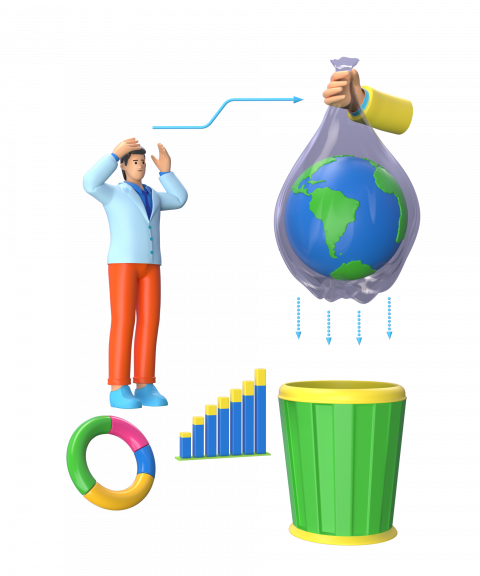Effects of Plastic bottle on our Environment, Nature, Earth
Plastic bottle have come to be an essential part of our daily lives, offering comfort and portability for our beverages and liquids. However, the convenience comes at a goodsized environmental cost. This article delves into the farreaching effects of plastic bottles on our environment, Nature, and the Earth as a whole.
What are the effects of plastic bottle?
- Pollution: Plastic bottles contribute to pollution in numerous ways:
- Land Pollution: Improper disposal of plastic bottles results in littering on land, harming landscapes and ecosystems. Plastic waste takes masses of years to decompose, cluttering natural environments.
- Water Pollution: Plastic bottles can become in water bodies, along with rivers, lakes, and oceans, wherein they wreck down into smaller microplastic debris. These particles can be ingested with the aid of aquatic life and, in turn, enter the meals chain, doubtlessly impacting human health.
- Air Pollution: Incineration of plastic bottles releases harmful pollution and greenhouse gases into the atmosphere, contributing to air pollution and weather alternate.
- Resource Depletion: The production of plastic bottles consumes important amounts of natural resources, consisting of fossil fuels (for plastic manufacturing) and water. The extraction and processing of those resources have environmental effects, which includes habitat destruction, water scarcity, and carbon emissions.
- Energy Consumption: Manufacturing plastic bottles is energyintensive. The manufacturing process, from extracting raw materials to molding bottles, consumes large amounts of energy, contributing to greenhouse gas emissions and climate change.
- Habitat Disruption: The extraction of raw materials for plastic manufacturing can result in habitat destruction, affecting ecosystems and biodiversity. Additionally, plastic pollution can disrupt aquatic and terrestrial habitats, harming wildlife.
- Wildlife Impact: Plastic bottles pose direct threats to the wildlife. Animals may additionally ingest plastic fragments or become entangled in plastic debris, leading to injury or death. Plastic pollutants can also disrupt the natural conduct and reproduction of species.
- Longevity: Plastic bottles persist within the surroundings for centuries, contributing to the problem of longtime period pollution. This persistence is due to the slow degradation of plastics.
- Microplastics: As plastic bottles breaks down, they release microplastic debris into the surroundings. These microplastics are dangerous to each flora and fauna and ecosystems and might probably locate their manner into the human food chain.
- Landfills: Many plastic bottles turn out to be in landfills, where they absorb space and release methane, a strong greenhouse gas. Over time, landfills can become assets of groundwater infection.
Plastic bottles, once seen as convenient vessels for our drinks, are increasingly diagnosed for their unfavorable effect on the surroundings, nature, and the Earth itself. The outcomes of plastic bottle manufacturing, disposal, and pollution are a long wayattaining, affecting ecosystems, wildlife, and human health. Addressing this trouble requires a concerted effort at all levels, from decreasing plastic intake and enhancing recycling to advocating for sustainable alternatives. By doing so, we can mitigate the damage to our planet and hold the beauty and balance of nature for future generations.
Certainly, let's amplify on the ways to mitigate the environmental impact of plastic bottles:
How to avoid the environmental effect of plastic bottle?
- Reduce Plastic Use:
- Choose Reusable Bottles: Opt for reusable water bottles made from materials like stainlesssteel, glass, or BPAunfastened plastic. These options can be used for an extended length, lowering the need for unmarrieduse plastic bottles.
- Filtered Water: Consider investing in water filtration structures at domestic to ensure get right of entry to to clean drinking water without the need for bottled water.
- Refill Stations: Support tasks that promote refillable water stations in public areas, permitting human beings to top off their bottles effectively.
- Recycle Properly:
- Check Local Recycling Guidelines: Understand the recycling pointers and centers available in your region. Different plastics may additionally require unique recycling methods.
- Rinse and Remove Caps: Rinse plastic bottles before recycling to reduce infection. Remove caps and labels, as those can be crafted from distinct materials.
- Promote Recycling Education: Advocate for multiplied public attention and schooling on proper recycling practices to make sure that plastic bottles are disposed of in an environmentally responsible way.
- Advocate for Sustainable Practices:
- Support Legislation: Advocate for rules and guidelines geared toward reducing plastic manufacturing and selling sustainable alternatives. Encourage lawmakers to enforce bottle deposit systems, plastic bans, or taxes on singleuse plastics.
- Corporate Responsibility: Hold organizations responsible for their packaging picks. Support organizations that prioritize ecofriendly packaging and stress the ones that don't to make sustainable changes.
- Consumer Awareness: Educate friends, circle of relatives, and your community about the environmental impacts of plastic bottles. Encourage accountable intake and disposal habits.
- Participate in CleanUp Efforts:
- Community CleanUps: Join or arrange network cleanup events to take away plastic waste from herbal environments, consisting of seashores, rivers, and parks.
- Support Environmental Organizations: Contribute to or volunteer with organizations focused on plastic pollution discount and environmental conservation.
- Reduce SingleUse Plastic Dependency:
- Bring Your Own: Carry reusable bags, utensils, and packing containers to reduce reliance on singleuse plastics whilst eating out or purchasing.
- Say No to Straws and Plastic Lids: Refuse plastic straws and lids when ordering beverages, or choose reusable options like metallic or bamboo straws.
- Promote Innovation and Research:
- Research Funding: Support research and improvement efforts aimed toward developing opportunity packaging materials which are biodegradable, recyclable, and environmentally pleasant.
- Circular Economy: Advocate for the adoption of circular financial system practices, which prioritize recycling, reusing, and decreasing waste within the production and consumption of plastic bottles.
- Educate and Engage:
- School Programs: Encourage faculties and educational institutions to encompass environmental schooling in their curricula, emphasizing the importance of lowering plastic waste.
- Social Media Awareness: Use social media structures to elevate attention about plastic bottle pollutants, share ecofriendly options, and engage with likeminded individuals and groups.
Mitigating the environmental effect of plastic bottles calls for a collective effort from people, groups, companies, and governments. By adopting sustainable practices, advocating for exchange, and selling cognizance, we can work together to lessen the damage because of plastic bottle production and pollution, maintaining the health of our planet and ecosystems for future generations.
There are several alternatives to plastic bottles that may be used for storing and carrying water and beverages. These alternatives are generally taken into consideration as safer and extra environmentally friendly.
What are the alternate options for plastic bottle?
- Stainless Steel Bottles:
Advantages: Stainless steel bottles are durable, nonreactive, and do now not leach chemical compounds into the contents. They also are resistant to rust and corrosion.
Benefits: Stainless metallic bottles are a famous desire for their sturdiness, making them suitable for both warm and cold drinks. They also are smooth to clean and hold.
Considerations: Stainless metal bottles can be heavier than plastic bottles, and that they can be greater expensive. However, their sturdiness and health benefits frequently outweigh the preliminary value. - Glass Bottles:
Advantages: Glass bottles are nonpoisonous and do no longer leach harmful chemical substances into the contents. They are also immune to odors and stains.
Benefits: Glass bottles are a safe and green desire for storing liquids. They are clean to easy and preserve and do no longer keep flavors or odors.
Considerations: Glass bottles are fragile and can wreck if dropped, making them much less suitable for outdoor sports or situations wherein sturdiness is essential. - Aluminum Bottles:
Advantages: Aluminum bottles are lightweight, long lasting, and recyclable. They also are immune to rust and corrosion.
Benefits: Aluminum bottles are an amazing preference for outside sports and sports. They are frequently used for storing cold liquids and are available in diverse sizes.
Considerations: Some aluminum bottles may additionally have interior coatings to save you flavor switch or reaction with acidic drinks. Check for BPAloose and foodgrade coatings. - Copper Bottles:
Advantages: Copper bottles are believed to have capacity fitness blessings, as copper is known for its antimicrobial houses. They also are long lasting and corrosionresistant.
Benefits: Copper bottles are used to keep water, and it is believed that copper can assist improve water pleasant by killing harmful bacteria. However, medical evidence for these claims is confined.
Considerations: Copper bottles require regular cleaning to maintain their look and hygiene. They might not be suitable for all drinks, as copper can react with acidic liquids. - Biodegradable or Compostable Bottles:
Advantages: Biodegradable or compostable bottles are crafted from plantbased totally materials like cornstarch or sugarcane. They are designed to break down more effortlessly within the environment.
Benefits: These bottles are a greater environmentally friendly choice, as they decompose faster than conventional plastics. They are appropriate for unmarrieduse programs.
Considerations: Biodegradable bottles might not be as durable as different options and can have limitations in terms of shelf life and heat resistance. - BPAFree Plastic Bottles:
Advantages: BPAloose plastic bottles are designed to be freed from BisphenolA and comparable chemical substances acknowledged for hormonal disruption.
Benefits: Some BPAloose plastic bottles offer a compromise between comfort and safety. They are regularly lighter and more lowcost than alternatives like chrome steel or glass.
Considerations: While BPAloose plastics are an development, they may nevertheless contain other chemical substances of problem, so it's crucial to analyze and choose official manufacturers.
Water Bottle is a Crucial part of our Daily Life
How it will give Advantages for Nature and Earth?
- Reduced Plastic Pollution: By the use of options to plastic bottles, people can help lessen the demand for singleuse plastics, which are a big supply of plastic pollution in oceans, rivers, and herbal environments.
- Conservation of Resources: Stainless metallic, glass, and aluminum bottles are frequently reusable for prolonged intervals, decreasing the intake of herbal assets and energy required for the production of disposable plastic bottles.
- Less Landfill Waste: Singleuse plastic bottles make contributions to landfill waste and take masses of years to decompose. Reusable options generate less waste and reduce the weight on landfills.
- Reduced Energy Consumption: The production of unmarrieduse plastic bottles is electricityintensive. Choosing reusable options can circuitously reduce electricity consumption and related greenhouse gasoline emissions.
- Lower Carbon Footprint: Glass, chrome steel, and aluminum bottles will have a lower carbon footprint over their lifetime as compared to unmarrieduse plastic bottles, which might be produced and transported in massive quantities.
- Biodegradability: Biodegradable or compostable bottle materials, whilst disposed of well, destroy down extra without difficulty in the surroundings, decreasing the patience of plastic waste.
- Preservation of Natural Habitats: By lowering plastic pollution, we assist protect natural habitats, natural world, and marine ecosystems from the dangerous results of plastic particles.
- Promotion of Sustainable Practices: The use of ecofriendly options promotes sustainability and encourages responsible purchaser picks, which could have a fantastic ripple effect on society and the environment.


.jpg)
.png)

.jpg)
.jfif)


.jpg)

.jpg)
.jpeg)

